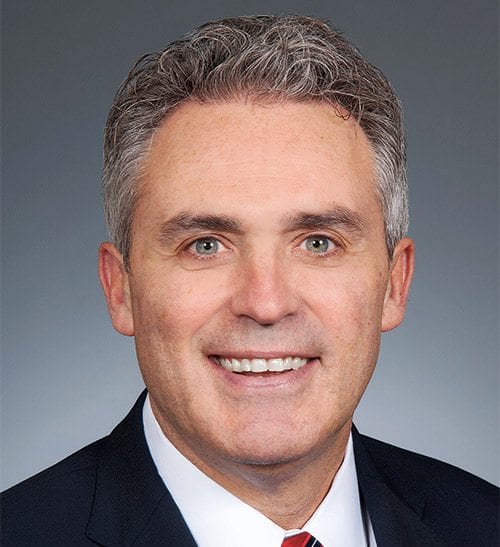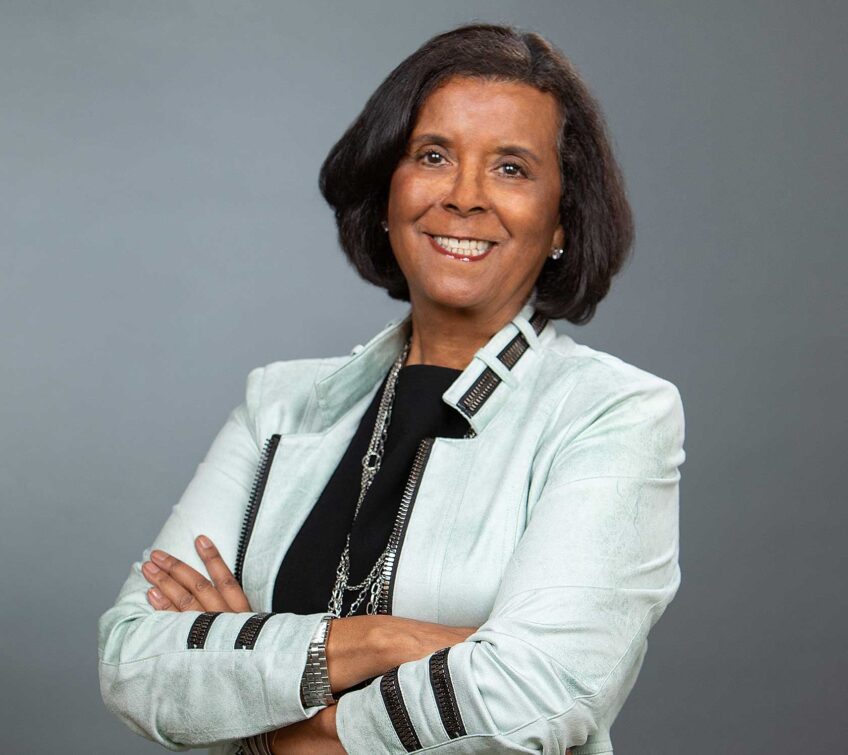A Q&A with James Rooney
Bringing new ideas to Greater Boston Chamber of Commerce

A year ago, the Greater Boston Chamber of Commerce ended one of the city’s most high-profile job searches with the recruitiment of former Convention Center Authority head James Rooney as president and CEO. The strong economic development work he did in over a decade with the state’s convention centers convinced most observers that this was a big win for the Chamber of Commerce — and that he was just the man to be the new face for the region’s major business support organization.
The South Boston native and current Dorchester resident Rooney, attended Harvard undergrad and Boston University for graduate school, and began his public career at the Massachusetts Bay Transportation Authority. He spent 18 years at the MBTA, starting as a track laborer and ending as deputy general manager. During the 1990s, Rooney served in senior positions at the Massachusetts Turnpike Authority and the Central Artery Project.
Rooney was also Chief of Staff to Boston Mayor Thomas M. Menino for several years around the turn of the century.
In 2001, he joined the Massachusetts Convention Center Authority. He is credited with playing a crucial role in the construction and continued development of the Boston Convention & Exhibition Center. He also oversaw the John B. Hynes Veterans Memorial Convention Center in Boston’s Back Bay and the MassMutual Center in Springfield. Under his leadership, the Convention Center Authority grew to become the agency generating more than $500 million in annual economic impact to the state.
Reflecting back on his first year at the helm of the Greater Boston Chamber of Commerce, Rooney spoke to Banner Biz about his priorities, the challenges Commonwealth businesses face, renewed development of the region, diversity strategies and the future of the chamber.
As president and chief executive officer of the Greater Boston Chamber of Commerce what do you view as your most important priority in leading the organization? What goals have you set for your tenure?
James Rooney: My immediate priority is for the Chamber to better connect with the region’s 21st century global innovation economy, both in terms of the startups and tech-based innovation economy companies, but also new economy participants including millennials, women and minorities. I would like the Chamber to be recognized as an organization that you need to connect with for your personal professional development and for business connections.
The Greater Boston Chamber of Commerce has set four core areas: Strategic Networking, Business Advocacy, Leadership Development and Innovation Initiatives. Which area represents the chamber’s strength at this point and in which area do you feel the chamber has the most opportunity to improve?
JR: The opportunities for connecting and networking are already very strong at the Chamber and can be leveraged further. I hope people will view us as a place to create strategic relationships. One product line we will be constantly reviewing is our events. The Chamber produces over 100 events per year featuring political and business leaders as speakers. We need to make sure they are welcoming and attractive to a broader audience.
In your prior work as executive director of the Massachusetts Convention Center Authority you received much praise for your efforts, especially in overseeing the addition of a number of new centers, including the Boston Convention & Exhibition Center. What do you bring from that job to your role at the Greater Boston Chamber of Commerce?
JR: I have told people that at the MCCA, my largest customer segment was “associations,” which are membership organizations. In my role at the convention center, I made it my business to understand the business dynamics and issues faced by associations, so I came to the Chamber – also a membership organization — equipped with some understanding of the challenges. How do you make your organization relevant? How do you engage young people?
With real estate rentals becoming so costly, many business startups are unable to find affordable commercial space in Boston. Can the Chamber help to ease that problem?
JR: The Chamber is supporting competitive real-estate pricing by finding opportunities to support incubators such as Mass Challenge and Techstarts, and co-working spaces like WeWork, Workbar and others. These programs help offset full office costs for smaller teams. In addition, I am interested in looking at how we support continued real estate development across Greater Boston as the city looks at future commerce areas in Roxbury, Somerville and elsewhere. This is a major topic for the Imagine Boston 2030 team, and our team will work closely with Mayor Martin J. Walsh’s office and business leaders to identify the next geographical centers for innovation. Lastly, I will continue to monitor the potential of programs like the N2 Corridor where potential innovators can congregate and get office space at a fraction of our downtown costs. These offer great alternatives for teams with different hiring requirements.
When Mike Dukakis was Governor, Route 128 was the national location of high-tech business development, the locus shifted to Silicon Valley. Are there plans for the development of another national business center in Boston?
JR: I think a major strength of our regional economy is that it is not focused in one industry. We are strong in a variety of industries like health care, biotech, education, high tech, tourism, financial services, and our innovation ecosystem has captured the world’s attention. Silicon Valley may have won the leadership role in tech, but we are still strong in that sector, and I think we are the world’s leader in the biotech industry. In terms of growth industries that Boston and Massachusetts can own, I think digital medical records and cybersecurity are huge opportunities for us.
At 1,500 members strong the Greater Boston Chamber of Commerce has a wide network of businesses to offer any potential members. However, as the face of the city’s average entrepreneur continues to change to reflect its growing diversity, how do you plan to make a stronger connection with small businesses from communities of color? How important is it for the chamber to be a resource to the growing urban entrepreneur movement?
JR: The economic participation gaps in Boston and other cities are real and well documented. Over the past seven months, I have learned that over many years, the Chamber has made several attempts to embrace the issue of building stronger connections with small businesses and entrepreneurs from communities of color, but I hope to elevate this issue on our priorities list. Yes, this is important if we want Boston to be a place where everyone feels they can succeed personally and professionally. We are currently talking to business leaders of all races about this issue to gain their perspectives and doing a lot of thinking about tactics and strategy on this right now.
The Chamber has always been viewed as the advocate of big business. Are there plans for the Chamber to extend its oversight to emerging companies?
JR: The Chamber has made and continues to make major strides in supporting all of Boston’s businesses. In January we brought in the Chamber’s first “Vice President of Innovation Leadership,” David Brown, to help track the needs of emerging companies in all sectors and to rework our programs and partnerships to better meet those needs. In addition, we are in the process of hiring a “Director of Inclusion,” who will help extend these same resources to women and minority led businesses, making the Chamber an ally to an important class of business leaders.
While the Greater Boston Chamber of Commerce can surely thrive with a connection to successful and established business professionals, it is always important to connect with younger generations in order to stay relevant for the future, as well as promote future growth. What are some or your efforts to do so?
JR: The Chamber already has a best-in-class Young Professionals Network that has attracted 2,500 young leaders in its first year, and we run both formal and informal mentorship programs throughout the year. And our internship portal for Boston-area college students helps encourage retention of young professionals when they graduate from our universities. In addition, we run three leadership programs with Harvard, MIT and Simmons College to help build relevant skills for the next generation of Boston leaders. But, Greater Boston is constantly changing and evolving, so I will always be evaluating our offerings and adjusting them to the changing needs of Boston’s workforce. I am excited by the energy and tenacity new businesses and new leaders bring to the city, and my goal is to help the development of both these companies and the workforce that supports them.
With decades of success behind it, what is next for Greater Boston Chamber of Commerce? Where do you see the organization in the next several years? Where do you see the organization in the next decade?
JR: Well, anyone who knows me knows I like to think big so it won’t be surprising to hear that I want the Boston Chamber to be recognized as the best regional business association in the world, an organization that everyone in any kind of business feels they need to establish a connection. But the reason I took this job, and my primary motivation, is to use this opportunity to help with the continuing effort of making Boston the best place for all people to do business, to live, to work, to raise a family or to visit.






